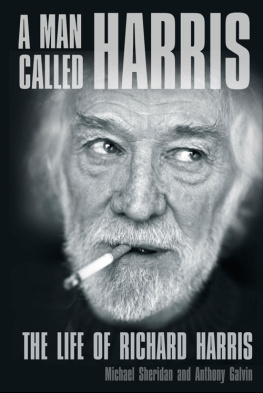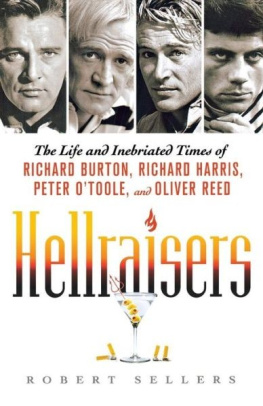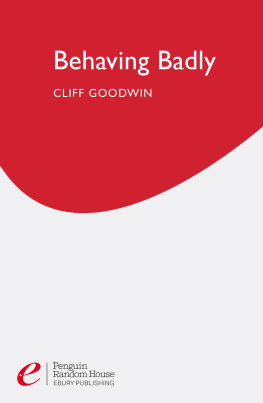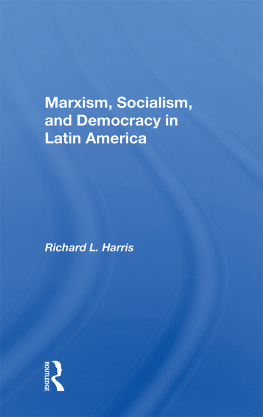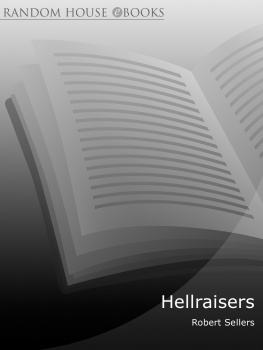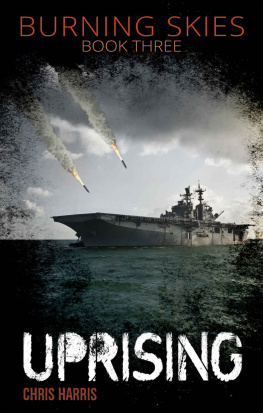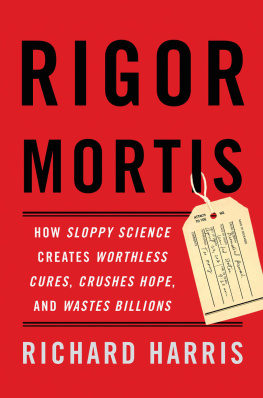
2013 is the 50th anniversary of This Sporting Life in which Richard Harris arguably played his greatest role. His portrayal of rugby league player Frank Machin got a BAFTA nomination for Best Actor, won the Cannes Film Festival Award for Best Actor and got an Academy Award nomination for Best Actor.
But thy eternal summer shall not fade,
Nor lose possession of that fair thou owst,
Nor shall death brag thou wanderst in his shade
When in eternal lines to time thou growst:
So long as men can breathe or eyes can see,
So long lives this, and this gives life to thee.
Shakespeare, Sonnet 18
Cover illustration Getty Images.
A number of people were very generous with their time and expertise during the preparation of this book. In no particular order we would like to thank the following people.
Richard Harriss only surviving sibling, Noel Harris. Lifelong friend Manuel Di Lucia and Dickies other friends who spoke to us, including Vincent Finucane and Kevin OConnor. Editor Alan English and news editor Eugene Phelan of the Limerick Leader . The patrons of Quinlans Bar and Charlie St Georges in Limerick. Tommy Monahan of Young Munster Rugby Club. Illusionist Peter Blackthorn and magician Tony Baloney. Ronan OLeary for his time and invaluable expertise. And all the Limerick people who shared their stories of the great man.
We thank them, but the opinions in the book are our own. Any errors that may have crept in are entirely our fault!
CONTENTS
A s the years passed, Richard Harris looked back on his childhood with a special fondness. Nowhere was as special for him as Kilkee, County Clare, where he had passed so many happy summer days. It was his Mecca, his Eden, and the place from where he set out on his journey to conquer Hollywood. It was no surprise that he kept returning there.
He came back most summers in his early days, and when he began to do well, he decided to buy a house in the resort. He purchased a place on his beloved West End, a big old Victorian terraced house called The Billows. It was a spectacular end-of-terrace two-storey building, one of the most elegant on the seafront. The house had an unusual side-by-side pair of double bay windows, with spectacular beach and bay views. It retained many of its period features, including high ceilings, and had six rooms.
Harris made the purchase in 1969, at the peak of his fame. Money was rolling in and he could afford to splash out on his new indulgence. He refurbished the house to the highest specifications, making it one of the most desirable residences in Kilkee.
His friend Manuel Di Lucia, an auctioneer and restaurateur, remembers the purchase well: He bought the house for 7,000, then spent 22,000 on doing it up. That was a staggering amount in the late 1960s, the equivalent today of spending perhaps half a million on renovations alone. Although Harris was in the process of divorcing his first wife, Elizabeth, she had a big say in the design of the new home. He also consulted his sister, Harmay. Little did he suspect that she would be dead within a year, and would never see the project to completion.
Much of the furniture and fittings were brought over to Ireland from London, and only the best was considered. It was done up by his wife Elizabeth and his sister Harmay, recalled Di Lucia. It was a mansion. It was the first house I ever saw with gold taps and bathroom fittings.
Limerick man Vincent Finucane, who had played rugby with Harris at Crescent College, got the job of doing the electrical refitting of the old house. I got a contract below in Kilkee to do up his house for him. He had electric storage heating before anyone else. He had all the fancy things. Finucane also remembers something else Harris had back then: He had this fancy piece there with him.
This would have been in 1970, as his marriage with Elizabeth finally imploded, leaving Harris a free agent. He began dating a 17-year-old actress, Linda Hayden. She was with him for the premire of Bloomfield in Limerick late that year, and also visited Kilkee, where the renovation work was nearing completion.
The house was eventually finished to a very high standard, and should have proved a haven for Harris from the shallowness and falsity of Hollywood, which he rebelled against. But it didnt turn out that way. The idea of buying the getaway had come to him near the end of his marriage. Perhaps he thought of it as a way of saving his family from the looming divorce. It would allow him and his wife and three sons to get away from everything and spend time together. But when the divorce papers were served, that dream was gone. And the other woman in his life, his beloved sister Harmay, fell ill in 1970. She underwent emergency surgery but never recovered.
It was a triple blow his wife and family had left him, his only remaining sister had died, and his directorial dbut, Bloomfield , had flopped. Harris had dreamed of filming Hamlet , with himself in the title role. For a while that looked possible. Then it was unlikely. After Bloomfield , it was impossible. As blow followed blow, it was enough to throw Harris into a deep depression. He hit the bottle hard, and moved from shallow relationship to shallow relationship. Life was one long party; it was a vain attempt to block out the pain.
Perhaps this is the reason why Harris never actually occupied the house in Kilkee. The house was part of a dream, and once the dream died his interest in the house died with it. He only ever spent a single night under its roof. He continued to visit Kilkee, but chose to stay in the Hydro Hotel.
He actually only slept one night in the house, Di Lucia said. Thats all. He used to give the house to a childrens orphanage in Limerick, a charity, for them to come on holidays to Kilkee.
Harris had gone off the house. But he had not abandoned the seaside resort. He spent a few weeks in Kilkee in the summer of 1970, staying in the Hydro Hotel. This was a few months before Harmays death, and before Bloomfield opened, so he was still in remarkably good spirits, despite his divorce. He threw himself into life in the small town, as he had in his teens.
The Tivoli Cup [for racquetball] was playing at that time, said Di Lucia. Dickie was 40 then, and I was 30. He was here for that week. I said that we wanted a bit of an attraction for the tournament, and would he enter? Ah Jesus, he said, Id never be fit enough for that. So we worked it that he wouldnt meet anyone too strong at the beginning. It was manipulated so that he would meet me in the quarter finals.
That was a clash that would draw out the crowds. Di Lucia was a very popular local man, involved in everything in the small town. Harris was Hollywood royalty and a four-time previous winner of the racquetball competition.
We set it up as a personality type of game, recalls Di Lucia who, being a bit larger than life himself, decided he would upstage Harris.
There was a pony and trap down on the beach and I got on that with a big towel around me, and a helmet with horns, and I had my racquet up in the air. Here I was, driving across the beach like a warrior coming to battle. Harris was standing by the alleys waiting for me, and he was bursting his sides laughing. He said: You would make a grand entrance and upstage me. I said it wasnt often people managed to do it!
The grand entrance proved to be the best part of Di Lucias game. Harris was paired with Mary OConnor, while Di Lucias partner was a Limerick woman, Ms Kennedy. The beach was thronged for the encounter, and the crowd got what they wanted. It was a very close game, with both sides going point for point and neither managing to dominate. But eventually Hollywood won out.
Next page
